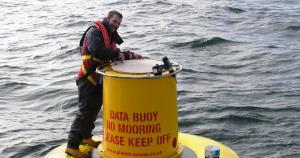AFBI Features on Blue Planet II
Date published:
Work being conducted in the “COMPASS” project, led by AFBI has recently featured on the website of Blue Planet II – the popular BBC programme.

Compass is an exciting new marine science project studying the seas around Ireland, Western Scotland and Northern Ireland and was launched this month. It will connect the regions’ leading marine research Institutes to form a cross-border network to protect vulnerable marine species and increase our understanding of the physical processes and ocean life in our seas.
The Marine Mammal programme of work, which was featured on Blue Planet II (BBC Blue Planet), is led by Dr Denise Risch from the Scottish Association for Marine Science (SAMS), who will work with AFBI’s Suzanne Beck and other scientists from the projects partner institutes, to develop and deliver a sustainable monitoring programme for cetaceans.
COMPASS will bring together experts to deliver regional-scale scientific programmes of work. The network will produce new marine monitoring data to investigate emerging areas of environmental concern including ocean acidification and increasing levels of ambient noise. The project will also develop hi-tech acoustic tag programmes to study migration patterns, behaviour, and mortality of salmon and sea trout in order to improve the management of fish stocks. Passive acoustic studies will provide new insights into the populations of marine mammals around our coasts, whilst advanced computer models will help us understand processes that require consideration over large geographical scales.
The COMPASS project will establish infrastructure that will enhance cross-border co-operation to ensure that information can be shared in a coherent and standardised way. This aspect of the project will allow data to flow into national and international marine monitoring programmes.
Funding for the COMPASS project has been provided by the EU’s INTERREG VA programme, which is managed by the Special EU Programmes Body (SEUPB), to the tune of €6.3m. This substantial investment will see a state-of-the-art network of buoys to effectively track, model and monitor aquatic life and the oceanographic processes which influence them across the seas that surround the 3 countries.